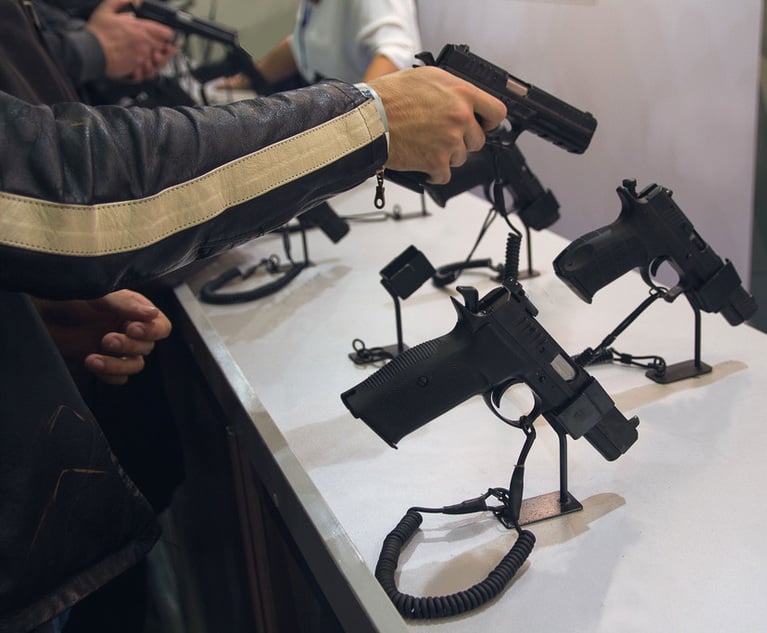 Science Biotechnology DNA illustration and abstract illustration Billion Photos/Shutterstock
Science Biotechnology DNA illustration and abstract illustration Billion Photos/Shutterstock The DNA Evidence Exception to the Statute of Limitations Should Be Construed Sensibly
We think the most sensible interpretation of the "DNA evidence" exception is that the limitation period begins once the state has possession of the forensic sample itself.
June 27, 2021 at 10:00 AM
5 minute read
In granting certification in State v. Bradley C. Thompson, the Supreme Court will decide whether an indictment for aggravated sexual assault committed in 2001 may be returned 16 years later in 2017, despite the five-year statute of limitations imposed on most criminal prosecutions under N.J.S.A. 2C:1-6. The issue arises due to the "DNA evidence exception" to the statute of limitations enacted by the Legislature in 2001, which provides that: "when the prosecution is supported by physical evidence that identifies the actor by means of DNA testing or fingerprint analysis, time does not start to run until the State is in possession of both the physical evidence and the DNA or fingerprint evidence necessary to establish the identification of the actor by means of comparison to the physical evidence." N.J.S.A. 2C:1-6(c). Interpreting the text of that statute is at the heart of this case.
The prolonged sequence of events in Thompson was as follows. A sexual assault occurred on July 21, 2001. A swab of dried saliva allegedly from the unidentified perpetrator was taken at the time from the victim's person, from which a DNA profile was derived. In our view, this is the "physical evidence" referred to in N.J.S.A. 2C:1-6(c). The state forensics lab entered that profile into CODIS, the national DNA index system maintained by the FBI, on Jan. 23, 2002.
This content has been archived. It is available through our partners, LexisNexis® and Bloomberg Law.
To view this content, please continue to their sites.
Not a Lexis Subscriber?
Subscribe Now
Not a Bloomberg Law Subscriber?
Subscribe Now
NOT FOR REPRINT
© 2025 ALM Global, LLC, All Rights Reserved. Request academic re-use from www.copyright.com. All other uses, submit a request to [email protected]. For more information visit Asset & Logo Licensing.
You Might Like
View All
Parents Must Be Responsible, or Face Possible Criminal Culpability for School Shootings
4 minute read
NJ Supreme Court Finds DWI Case 'Illuminates a Flaw' in Notification Procedures Post-'Cassidy'
6 minute read
NJ Justices Should Reverse Appellate Division Green Light for Glove Box Searches
4 minute read
Emerging Case Law Offers Support for Sexual Assault Victims Seeking Restraining Orders
6 minute readTrending Stories
- 1Judge Pauses Deadline for Federal Workers to Accept Trump Resignation Offer
- 2DeepSeek Isn’t Yet Impacting Legal Tech Development. But That Could Soon Change.
- 3'Landmark' New York Commission Set to Study Overburdened, Under-Resourced Family Courts
- 4Wave of Commercial Real Estate Refinance Could Drown Property Owners
- 5Redeveloping Real Estate After Natural Disasters: Challenges, Strategies and Opportunities
Who Got The Work
J. Brugh Lower of Gibbons has entered an appearance for industrial equipment supplier Devco Corporation in a pending trademark infringement lawsuit. The suit, accusing the defendant of selling knock-off Graco products, was filed Dec. 18 in New Jersey District Court by Rivkin Radler on behalf of Graco Inc. and Graco Minnesota. The case, assigned to U.S. District Judge Zahid N. Quraishi, is 3:24-cv-11294, Graco Inc. et al v. Devco Corporation.
Who Got The Work
Rebecca Maller-Stein and Kent A. Yalowitz of Arnold & Porter Kaye Scholer have entered their appearances for Hanaco Venture Capital and its executives, Lior Prosor and David Frankel, in a pending securities lawsuit. The action, filed on Dec. 24 in New York Southern District Court by Zell, Aron & Co. on behalf of Goldeneye Advisors, accuses the defendants of negligently and fraudulently managing the plaintiff's $1 million investment. The case, assigned to U.S. District Judge Vernon S. Broderick, is 1:24-cv-09918, Goldeneye Advisors, LLC v. Hanaco Venture Capital, Ltd. et al.
Who Got The Work
Attorneys from A&O Shearman has stepped in as defense counsel for Toronto-Dominion Bank and other defendants in a pending securities class action. The suit, filed Dec. 11 in New York Southern District Court by Bleichmar Fonti & Auld, accuses the defendants of concealing the bank's 'pervasive' deficiencies in regards to its compliance with the Bank Secrecy Act and the quality of its anti-money laundering controls. The case, assigned to U.S. District Judge Arun Subramanian, is 1:24-cv-09445, Gonzalez v. The Toronto-Dominion Bank et al.
Who Got The Work
Crown Castle International, a Pennsylvania company providing shared communications infrastructure, has turned to Luke D. Wolf of Gordon Rees Scully Mansukhani to fend off a pending breach-of-contract lawsuit. The court action, filed Nov. 25 in Michigan Eastern District Court by Hooper Hathaway PC on behalf of The Town Residences LLC, accuses Crown Castle of failing to transfer approximately $30,000 in utility payments from T-Mobile in breach of a roof-top lease and assignment agreement. The case, assigned to U.S. District Judge Susan K. Declercq, is 2:24-cv-13131, The Town Residences LLC v. T-Mobile US, Inc. et al.
Who Got The Work
Wilfred P. Coronato and Daniel M. Schwartz of McCarter & English have stepped in as defense counsel to Electrolux Home Products Inc. in a pending product liability lawsuit. The court action, filed Nov. 26 in New York Eastern District Court by Poulos Lopiccolo PC and Nagel Rice LLP on behalf of David Stern, alleges that the defendant's refrigerators’ drawers and shelving repeatedly break and fall apart within months after purchase. The case, assigned to U.S. District Judge Joan M. Azrack, is 2:24-cv-08204, Stern v. Electrolux Home Products, Inc.
Featured Firms
Law Offices of Gary Martin Hays & Associates, P.C.
(470) 294-1674
Law Offices of Mark E. Salomone
(857) 444-6468
Smith & Hassler
(713) 739-1250






